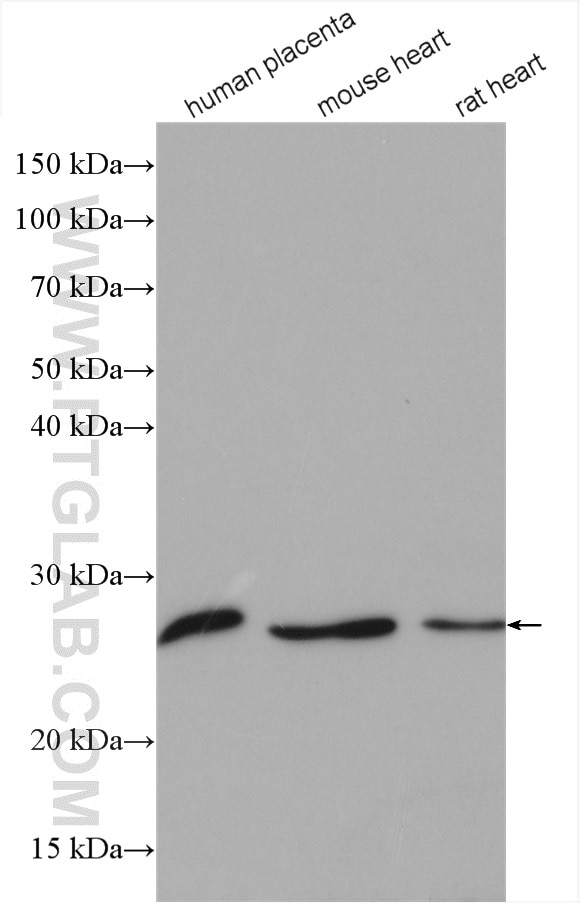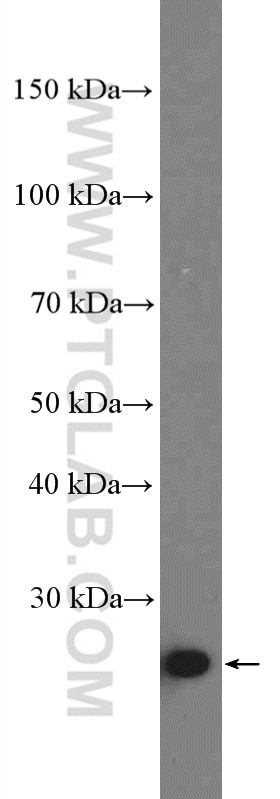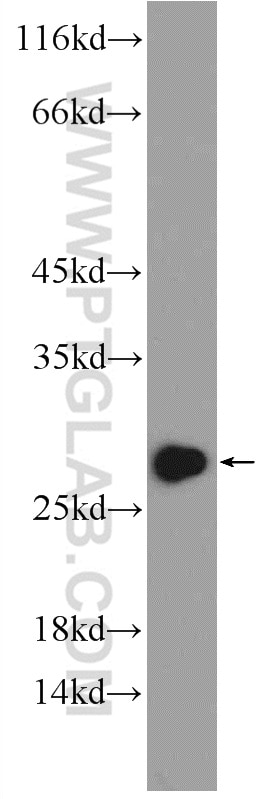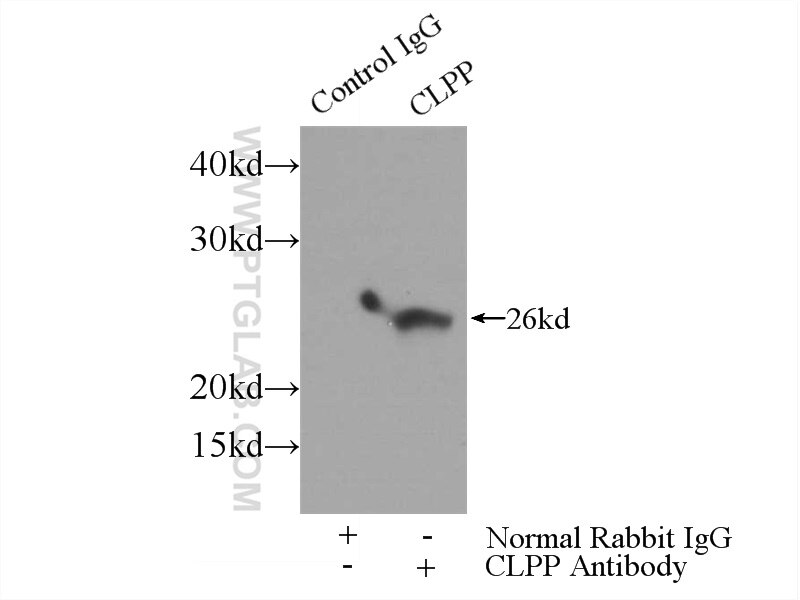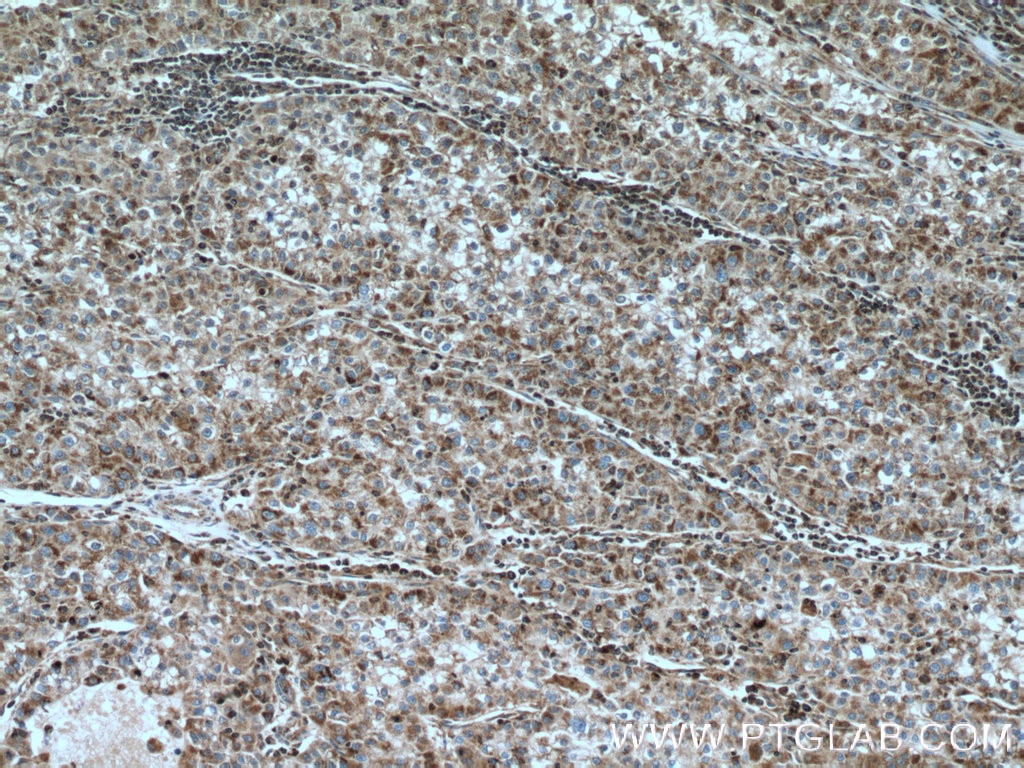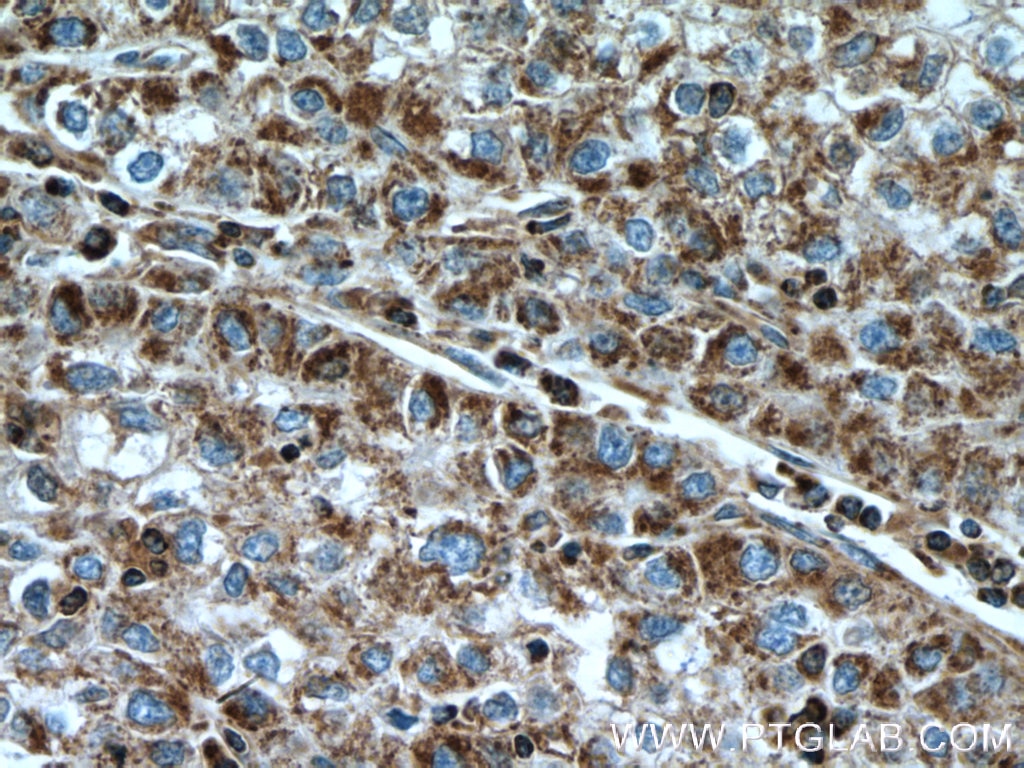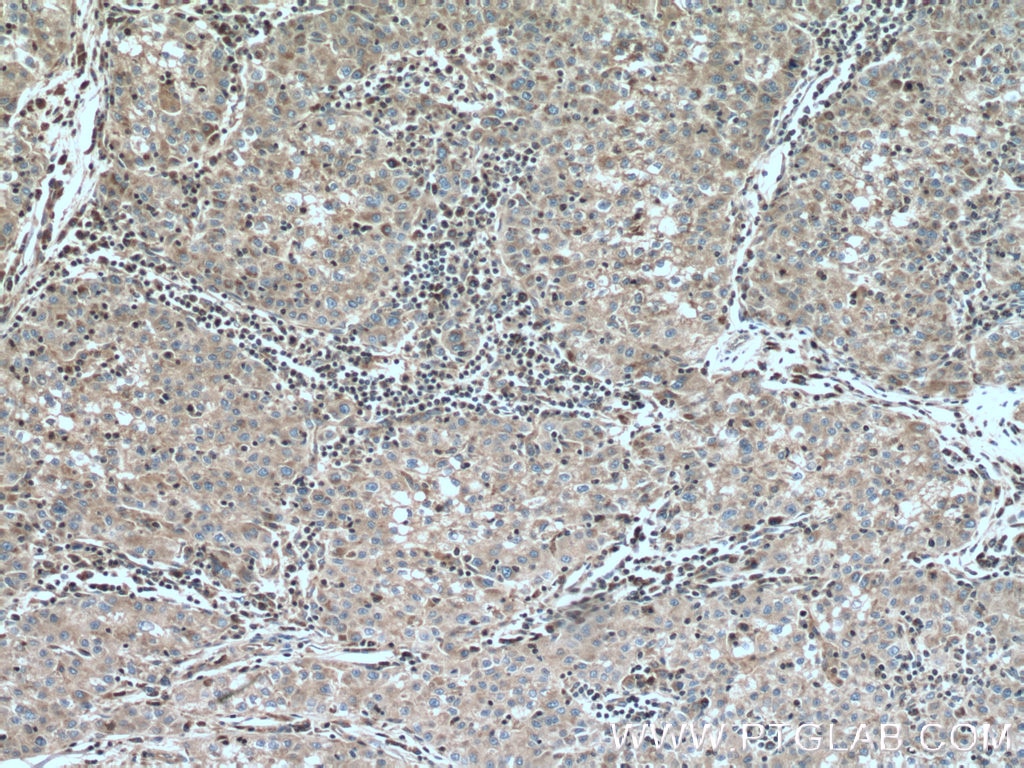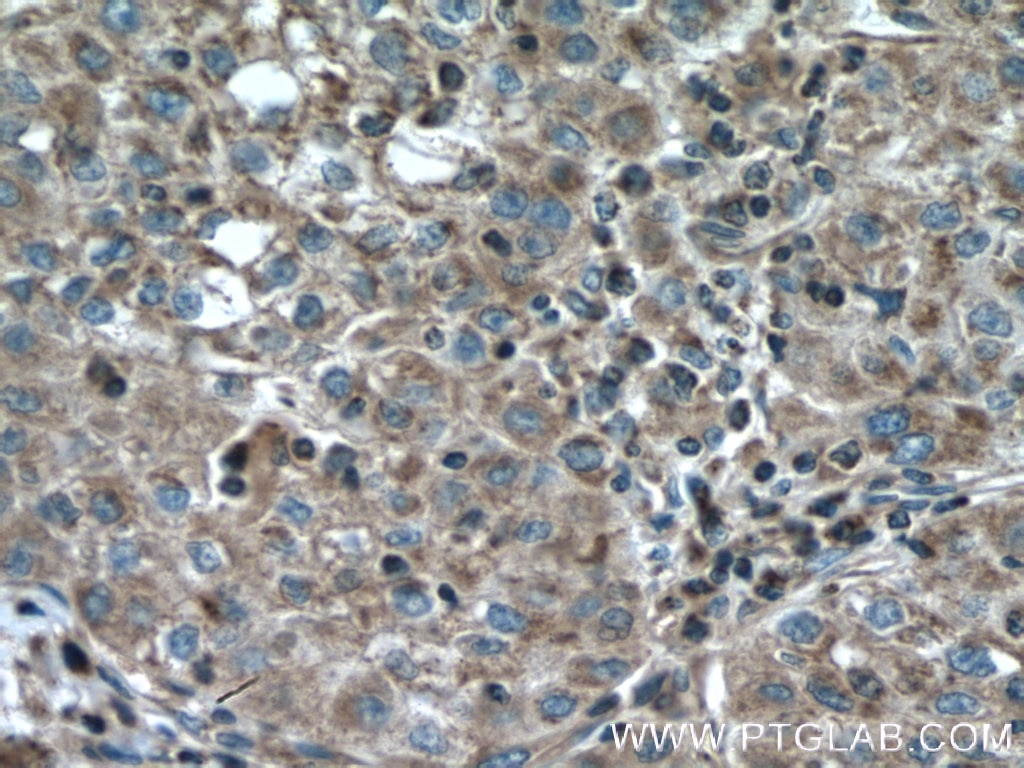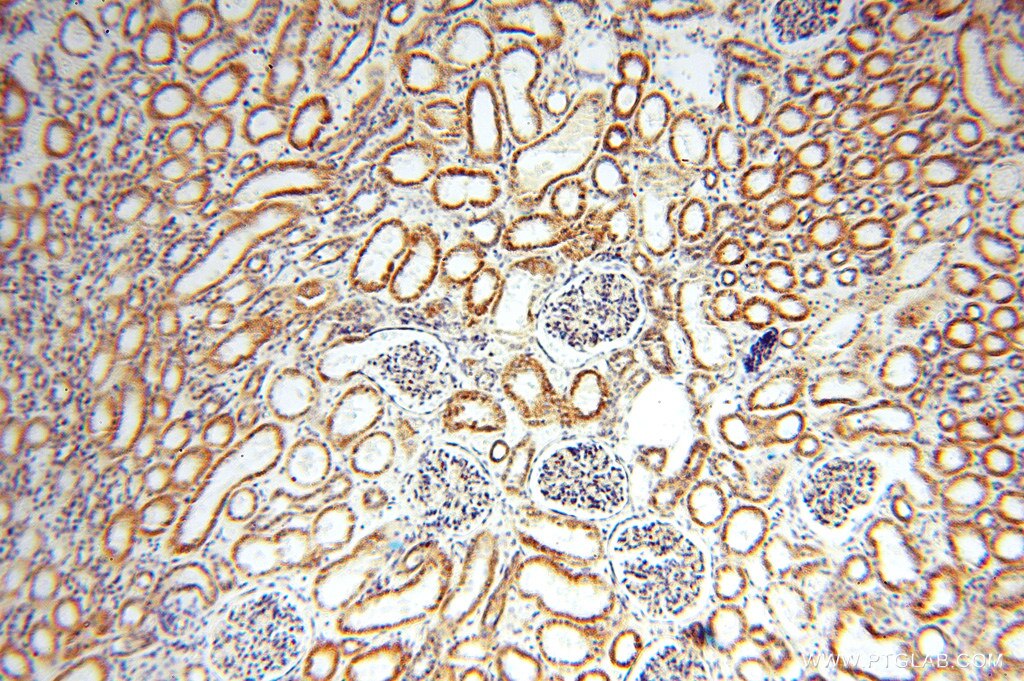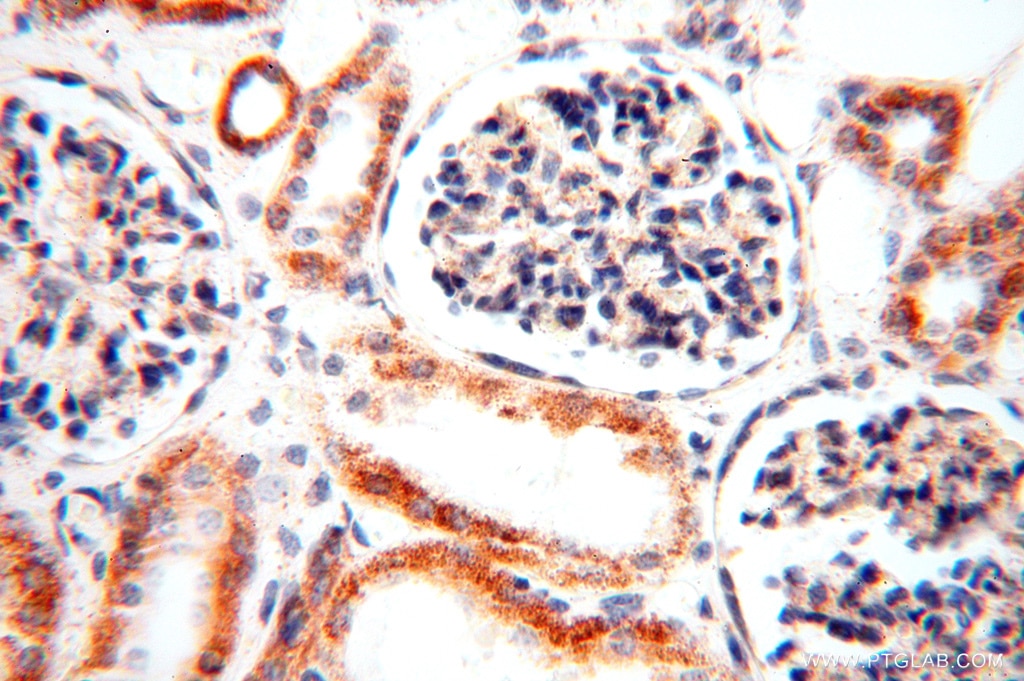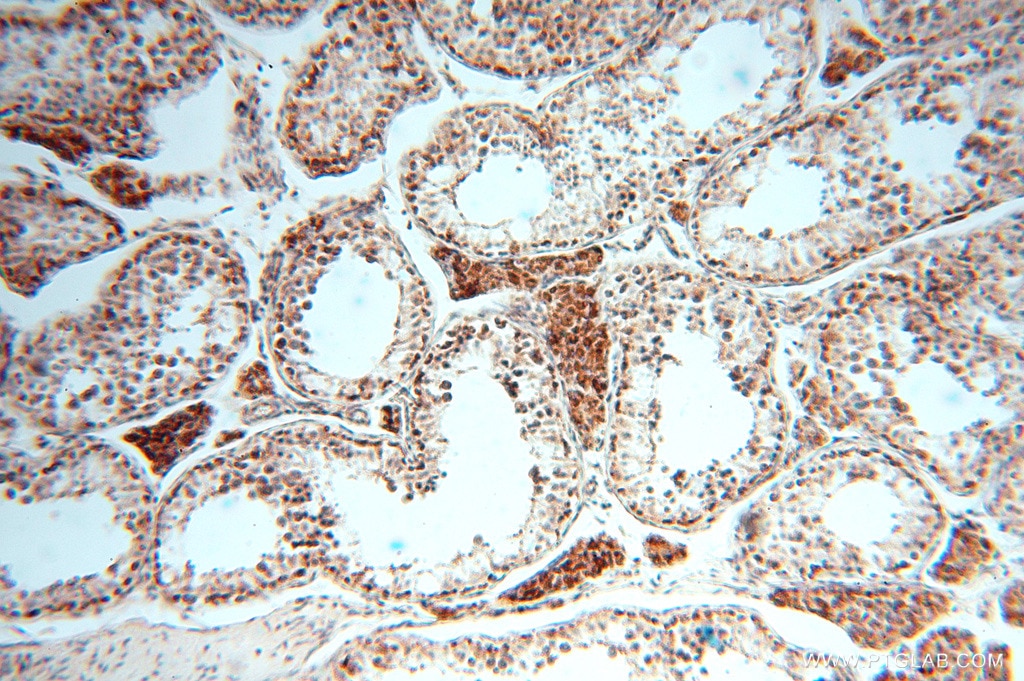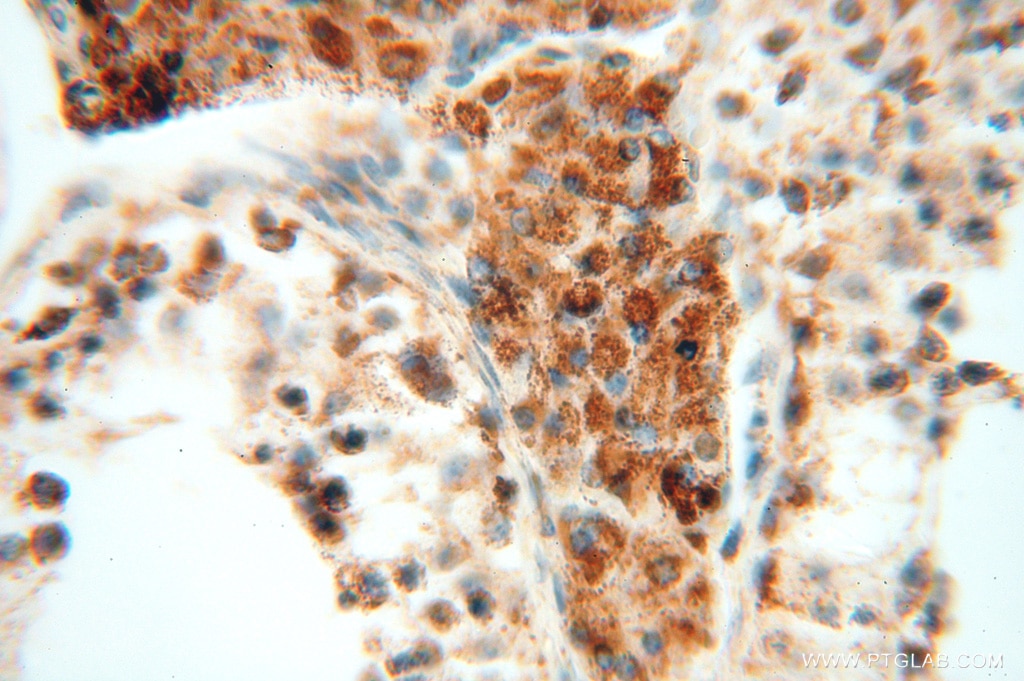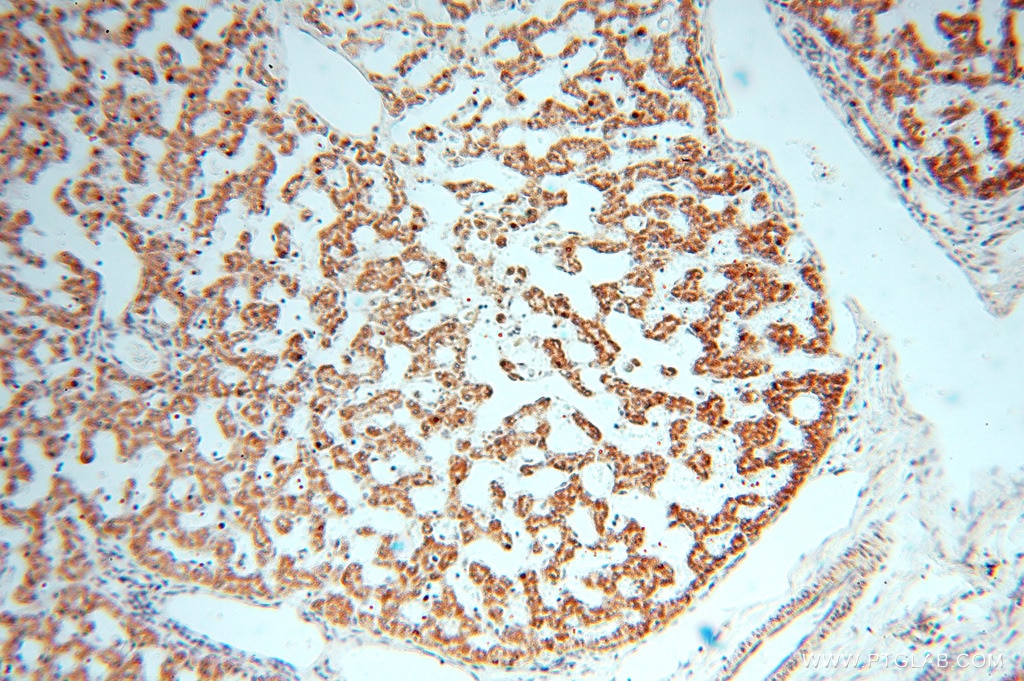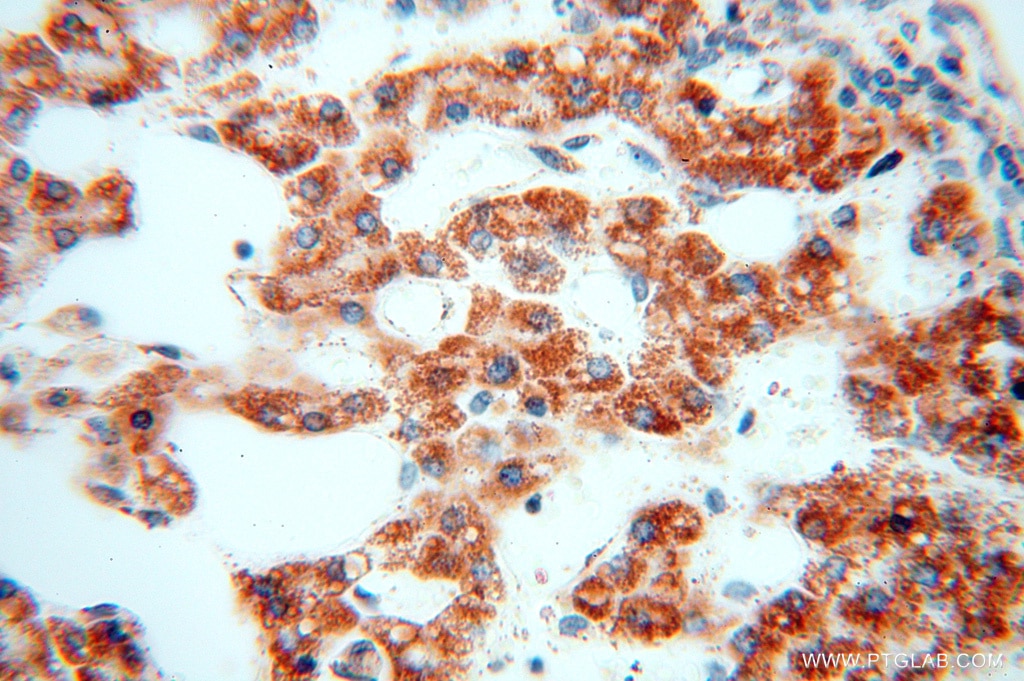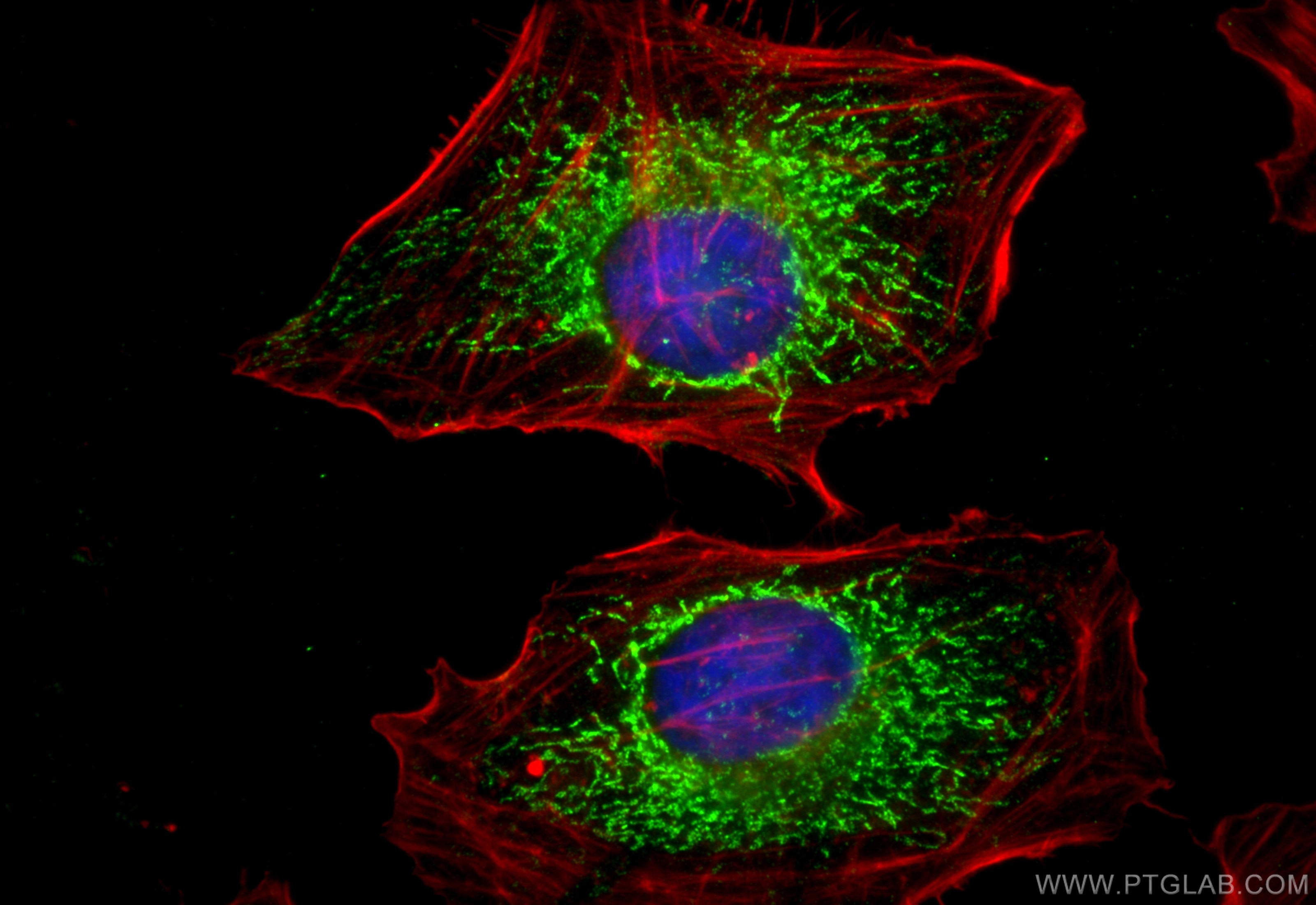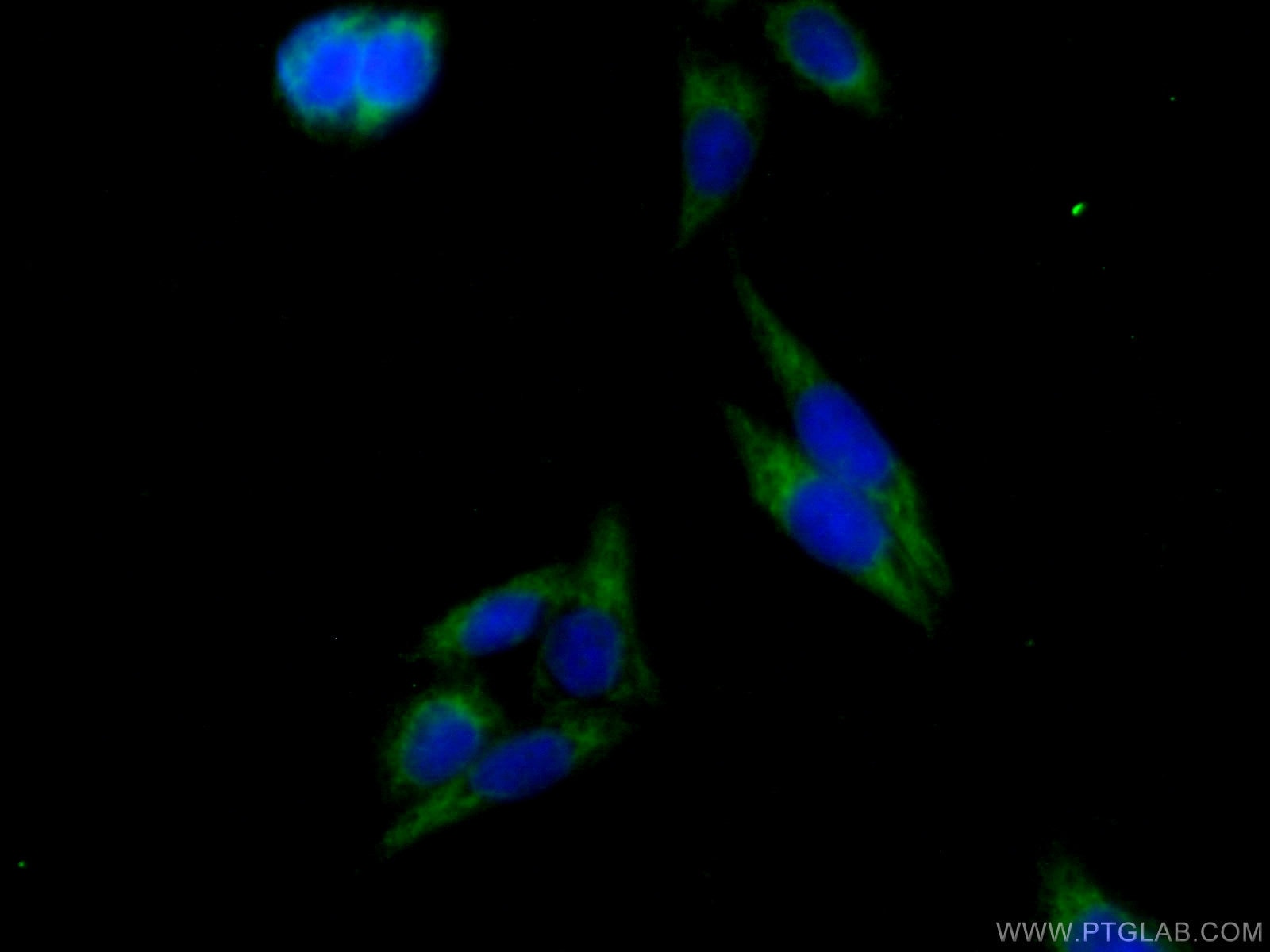- Featured Product
- KD/KO Validated
CLPP Polyklonaler Antikörper
CLPP Polyklonal Antikörper für WB, IHC, IF/ICC, IP, ELISA
Wirt / Isotyp
Kaninchen / IgG
Getestete Reaktivität
human, Maus, Ratte und mehr (3)
Anwendung
WB, IHC, IF/ICC, IP, CoIP, ELISA
Konjugation
Unkonjugiert
Kat-Nr. : 15698-1-AP
Synonyme
Geprüfte Anwendungen
| Erfolgreiche Detektion in WB | humanes Plazenta-Gewebe, K-562-Zellen, Mausherzgewebe, Rattenherzgewebe |
| Erfolgreiche IP | Maus-Skelettmuskelgewebe |
| Erfolgreiche Detektion in IHC | humanes Leberkarzinomgewebe, humanes Nierengewebe, humanes Lebergewebe, humanes Hodengewebe Hinweis: Antigendemaskierung mit TE-Puffer pH 9,0 empfohlen. (*) Wahlweise kann die Antigendemaskierung auch mit Citratpuffer pH 6,0 erfolgen. |
| Erfolgreiche Detektion in IF/ICC | HeLa-Zellen |
Empfohlene Verdünnung
| Anwendung | Verdünnung |
|---|---|
| Western Blot (WB) | WB : 1:1000-1:8000 |
| Immunpräzipitation (IP) | IP : 0.5-4.0 ug for 1.0-3.0 mg of total protein lysate |
| Immunhistochemie (IHC) | IHC : 1:50-1:500 |
| Immunfluoreszenz (IF)/ICC | IF/ICC : 1:50-1:500 |
| It is recommended that this reagent should be titrated in each testing system to obtain optimal results. | |
| Sample-dependent, check data in validation data gallery | |
Veröffentlichte Anwendungen
| KD/KO | See 4 publications below |
| WB | See 50 publications below |
| IHC | See 3 publications below |
| IF | See 3 publications below |
| CoIP | See 1 publications below |
Produktinformation
15698-1-AP bindet in WB, IHC, IF/ICC, IP, CoIP, ELISA CLPP und zeigt Reaktivität mit human, Maus, Ratten
| Getestete Reaktivität | human, Maus, Ratte |
| In Publikationen genannte Reaktivität | human, Huhn, Maus, Ratte, Zebrafisch, Ziege |
| Wirt / Isotyp | Kaninchen / IgG |
| Klonalität | Polyklonal |
| Typ | Antikörper |
| Immunogen | CLPP fusion protein Ag8325 |
| Vollständiger Name | ClpP caseinolytic peptidase, ATP-dependent, proteolytic subunit homolog (E. coli) |
| Berechnetes Molekulargewicht | 30 kDa |
| Beobachtetes Molekulargewicht | 26 kDa, 30 kDa |
| GenBank-Zugangsnummer | BC002956 |
| Gene symbol | CLPP |
| Gene ID (NCBI) | 8192 |
| Konjugation | Unkonjugiert |
| Form | Liquid |
| Reinigungsmethode | Antigen-Affinitätsreinigung |
| Lagerungspuffer | PBS with 0.02% sodium azide and 50% glycerol |
| Lagerungsbedingungen | Bei -20°C lagern. Nach dem Versand ein Jahr lang stabil Aliquotieren ist bei -20oC Lagerung nicht notwendig. 20ul Größen enthalten 0,1% BSA. |
Hintergrundinformationen
CLPP is the putative ATP-dependent Clp protease proteolytic subunit and also named as endopeptidase Clp. It belongs to the peptidase S14 family. Clp cleaves peptides in various proteins in a process that requires ATP hydrolysis. It may be responsible for a fairly general and central housekeeping function rather than for the degradation of specific substrates. This protein has a transit peptide of 56 amino acid.
Protokolle
| PRODUKTSPEZIFISCHE PROTOKOLLE | |
|---|---|
| WB protocol for CLPP antibody 15698-1-AP | Protokoll herunterladen |
| IHC protocol for CLPP antibody 15698-1-AP | Protokoll herunterladenl |
| IF protocol for CLPP antibody 15698-1-AP | Protokoll herunterladen |
| IP protocol for CLPP antibody 15698-1-AP | Protokoll herunterladen |
| STANDARD-PROTOKOLLE | |
|---|---|
| Klicken Sie hier, um unsere Standardprotokolle anzuzeigen |
Publikationen
| Species | Application | Title |
|---|---|---|
Cell Metab Fibroblast Growth Factor 21 Drives Dynamics of Local and Systemic Stress Responses in Mitochondrial Myopathy with mtDNA Deletions. | ||
Cell Metab mTORC1 Regulates Mitochondrial Integrated Stress Response and Mitochondrial Myopathy Progression. | ||
Mol Cell The mitochondrial DNAJC co-chaperone TCAIM reduces α-ketoglutarate dehydrogenase protein levels to regulate metabolism
| ||
Cell Metab Proteolytic cleavage of opa1 stimulates mitochondrial inner membrane fusion and couples fusion to oxidative phosphorylation. | ||
Sci Adv Mitochondrial proteostasis stress in muscle drives a long-range protective response to alleviate dietary obesity independently of ATF4. | ||
Nat Commun Disuse-associated loss of the protease LONP1 in muscle impairs mitochondrial function and causes reduced skeletal muscle mass and strength. |
Rezensionen
The reviews below have been submitted by verified Proteintech customers who received an incentive for providing their feedback.
FH Anh (Verified Customer) (07-15-2021) | very good, very clear bands
|
FH Mariusz (Verified Customer) (02-06-2019) | Excellent antibody bot for Western blot (1:2000) dilution and immunofluorescence (1:200). Single band on Western, and clean signal reflecting mitochondrial matrix in IF.
|
